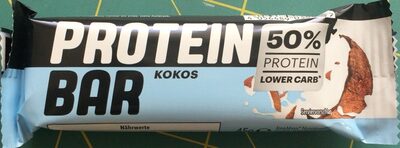
Barcode: 4056489130758
Protein Bar Kokos
DOUBTFUL
📝 Reason: The product contains ingredients like Milcheiweißmischung and Vollmilchpulver which are derived from milk but lack Halal certification, making their status doubtful. According to Islamic dietary laws, any doubtful ingredient without clear Halal certification should be avoided.
📄 Certificates: None
Ingredients:
Details
Understanding the Halal Status of Protein Bar Kokos
When it comes to dietary choices, many individuals seek guidance on the Halal status of their food products. Protein Bar Kokos has gained attention in the health market, but what about its compliance with Halal dietary laws? In this post, we will explore the ingredients of this protein bar and clarify its Halal standing.
What Does Halal Mean?
Halal is an Arabic term meaning ‘permissible’ in relation to food consumption according to Islamic law. For a product to be considered Halal, all ingredients must comply with specific Islamic dietary regulations, and it often needs to be certified by a credible organization. Without proper certification, it can be challenging to ensure that a product is genuinely Halal.
Ingredients in Protein Bar Kokos
The Protein Bar Kokos contains the following ingredients:
- Milcheiweißmischung (Calciumcaseinat, Molkeneiweißkonzentrat, Molkeneiweißisolat)
- Glycerin
- Kollagenhydrolysat
- Maltit
- Kakaobutter
- Vollmilchpulver
- Kakaomasse
- Magermilchpulver
- Lecithine (Soja)
- Sojaeiweißisolat
- Palmfett
- Kokosflocken
- Kokosnusspulver (Kokosnuss, Maltodextrin, Natriumcaseinat)
- Inulin
- Citronensäure
- Speisesalz
- Sucralose
- Lecithine
- Alpha-Tocopherol
Ingredient Analysis and Halal Compliance
To better understand the Halal status of Protein Bar Kokos, let’s take a closer look at the E-numbers and ingredients included:
- Milcheiweißmischung: This mixture includes Calciumcaseinat, Molkeneiweißkonzentrat, and Molkeneiweißisolat. These are dairy-derived products that lack a Halal logo, leading to a status classified as doubtful.
- Glycerin (E422): Compliant with Halal standards, derived from plant sources or synthetic processes.
- Kollagenhydrolysat: Also lacking Halal certification; its source remains unclear, making it dubious.
- Maltit (E965): Halal compliant, generally derived from sugar beets or corn.
- Kakaobutter: Naturally Halal compliant and derived from cacao beans.
- Vollmilchpulver: Another dairy product that does not have Halal certification.
- Kakaomasse: Halal compliant, made from ground cacao beans.
- Magermilchpulver: Similar to Vollmilchpulver, it also lacks Halal certification.
- Lecithine (Soja) (E322): Halal compliant, often derived from soybeans.
- Sojaeiweißisolat: Halal compliant, sourced from soybeans.
- Palmfett: Halal compliant, as long as it follows guidelines from Halal sources.
- Kokosflocken: Natural and Halal compliant, derived from coconuts.
- Kokosnusspulver: Categorized under a doubtful status due to the inclusion of Natriumcaseinat, which may not be Halal certified.
- Inulin: Halal compliant, typically sourced from chicory root or Jerusalem artichoke.
- Citronensäure (E330): Halal compliant as it can be derived from both citrus fruits and fermentation processes.
- Speisesalz: Halal compliant, as it is a natural mineral.
- Sucralose (E955): Halal compliant as it is synthetically produced.
- Alpha-Tocopherol (E307): A form of Vitamin E, Halal compliant.
The Overall Halal Status of Protein Bar Kokos
Considering the analysis above, Protein Bar Kokos creates uncertainty for Halal-conscious consumers. The presence of multiple dairy-derived ingredients like Milcheiweißmischung and Vollmilchpulver without Halal certification significantly undermines its Halal status. While some ingredients are compliant, the lack of coherence in certification leads to a labeling of ‘doubtful.’ The absence of any relevant Halal certification makes it an unwise choice for strict adherents to Halal dietary laws.
Conclusion
In conclusion, while Protein Bar Kokos includes some Halal compliant ingredients, the overall product remains in a doubtful status due to several dubious ingredients lacking clear Halal certification. Always check product labels and certifications to make informed dietary choices adhering to Halal guidelines.

